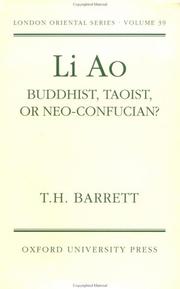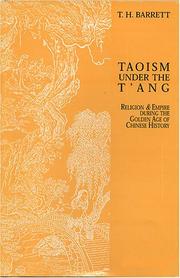| Listing 1 - 7 of 7 |
Sort by
|

ISBN: 0197136095 9780197136096 Year: 1992 Volume: 39 Publisher: Oxford : Oxford university press,
Abstract | Keywords | Export | Availability | Bookmark
 Loading...
Loading...Choose an application
- Reference Manager
- EndNote
- RefWorks (Direct export to RefWorks)
Neo-Confucianism, the state sponsored orthodoxy of China's later empires, is now recognized as an important key to understanding China. This study looks at the roots of Neo-Confucianism in an age when Buddhism and Taoism had eclipsed the Confucian tradition in importance. Li Ao (c. 772-836 A.D.), though generally acknowledged as a forerunner of Neo-Confucianism, is still regarded as deeply influenced by Buddhism. The historical reasons for the creation of this image of Li Ao are examined, prior to a close investigation of the actual circumstances which shaped his Fu-hsing shu, 'Book of Returning to One's True Nature,' the essay which had the deepest influence on the development of early Neo-Confucianism. Although common assumptions about Buddhist influence on Li Ao are questioned, the true importance of the essay emerges in the typically Chinese patterns of thought which it exhibits and which gave it an impact transcending the immediate circumstances that prompted its writing. Li Ao is an important contribution for academics and students interested in East Asian history and thought and religious studies, especially Buddhist studies.
Buddhism. --- Neo-Confucianism. --- Taoism. --- Li, Ao, --- Philosophy. --- Religion. --- Buddhism --- Neo-Confucianism --- Taoism --- S12/0230 --- S12/0430 --- S13A/0310 --- Daoism --- Taouism --- Religions --- Tao --- Confucianism --- Philosophy, Chinese --- Buddha and Buddhism --- Lamaism --- Ris-med (Lamaism) --- China: Philosophy and Classics--Chinese philosophy: Sui and Tang --- China: Philosophy and Classics--Neo-Confucianists: general and Song (including lixue 理學) --- China: Religion--Buddhism: China --- Li, Wen gong, --- Ri, Kō, --- Li, Wen kung, --- Ri, Bun-kō, --- 李翱, --- 李翺,
Dissertation
Year: 1989 Publisher: Ann Arbor (Mich.) : University microfilms international,
Abstract | Keywords | Export | Availability | Bookmark
 Loading...
Loading...Choose an application
- Reference Manager
- EndNote
- RefWorks (Direct export to RefWorks)

ISBN: 1891640259 9781891640254 Year: 2006 Publisher: Warren : Floating World,
Abstract | Keywords | Export | Availability | Bookmark
 Loading...
Loading...Choose an application
- Reference Manager
- EndNote
- RefWorks (Direct export to RefWorks)
Book
Year: 1978 Publisher: Ann Arbor University Microfilms International
Abstract | Keywords | Export | Availability | Bookmark
 Loading...
Loading...Choose an application
- Reference Manager
- EndNote
- RefWorks (Direct export to RefWorks)
Confucianism --- Confucianists --- History --- Relations --- Buddhism --- Taoism --- Li Ao,
Article
Abstract | Keywords | Export | Availability | Bookmark
 Loading...
Loading...Choose an application
- Reference Manager
- EndNote
- RefWorks (Direct export to RefWorks)
Article
Abstract | Keywords | Export | Availability | Bookmark
 Loading...
Loading...Choose an application
- Reference Manager
- EndNote
- RefWorks (Direct export to RefWorks)
Book
ISBN: 9789882378940 9789882371774 9882378943 9882371779 Year: 2022 Publisher: [S.l.] CHINESE UNIV HONG KONG PR
Abstract | Keywords | Export | Availability | Bookmark
 Loading...
Loading...Choose an application
- Reference Manager
- EndNote
- RefWorks (Direct export to RefWorks)
This edited volume investigates translations from the languages of China into the languages of Western societies, from the 17th to the 20th centuries. Rather than focusing solely on the activity of translation, the authors extend their explorations to cover the contexts within which the translators worked from different perspectives, touching on various aspects of the institutional and intellectual backgrounds that informed their writings. Studies of translation from literary Chinese into English constitute the majority of the contributions, but the volume is also illuminated by excursions into Latin, French and Italian, while the problems of translating the Naxi script are confronted as well. In addition, the wider context of the rendering of Chinese into other languages is explored through a survey of recent Japanese translation series. Throughout the volume, translation is presented not simply as a linguistic exercise but rather as a key element in world history, well worthy of further interdisciplinary investigation.
Chinese literature --- Chinese classics --- Translating and interpreting --- Translations --- History and criticism --- China --- Study and teaching --- History.
| Listing 1 - 7 of 7 |
Sort by
|

 Search
Search Feedback
Feedback About UniCat
About UniCat  Help
Help News
News